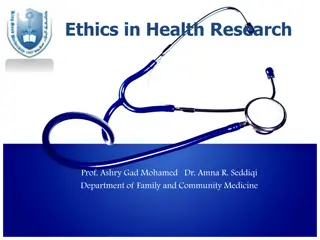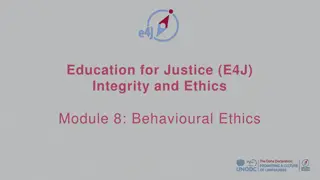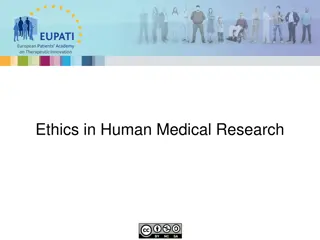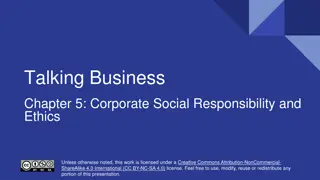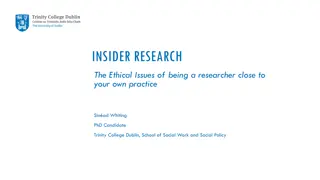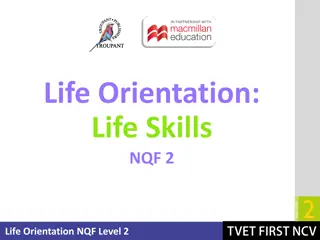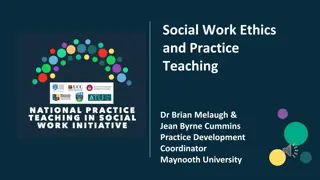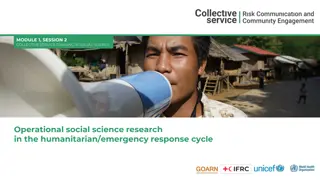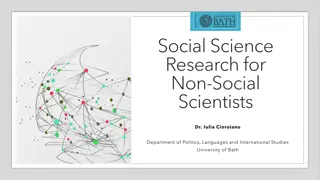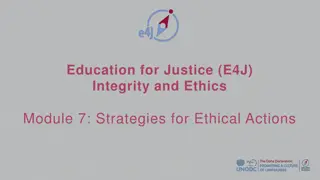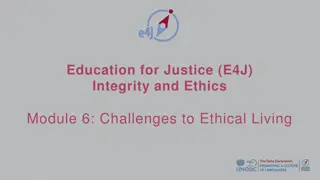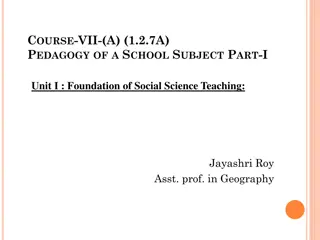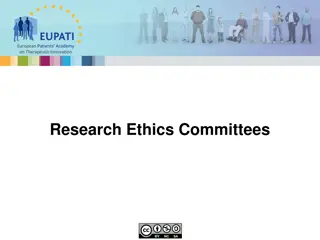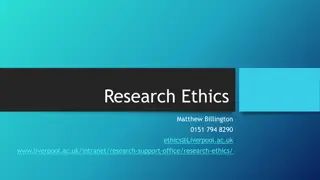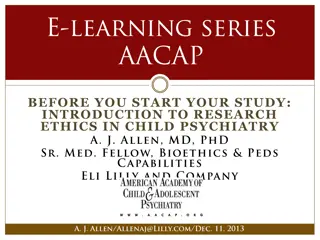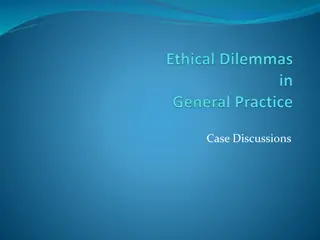Promoting Ethical Principles in Social Science Research
Explore the challenges and strategies for translating and applying ethical principles, especially in emergency contexts. Learn key questions in social science research and how to ensure information contributes to community actions. Understand the importance of considering ethical principles in all work and applying principles like respect for persons, informed consent, right to withdraw, and privacy & confidentiality.
Download Presentation

Please find below an Image/Link to download the presentation.
The content on the website is provided AS IS for your information and personal use only. It may not be sold, licensed, or shared on other websites without obtaining consent from the author. Download presentation by click this link. If you encounter any issues during the download, it is possible that the publisher has removed the file from their server.
E N D
Presentation Transcript
MODULE 3, SESSION 2 COLLECTIVE SERVICE TRAINING IN SOCIAL SCIENCE Promoting the meaningful translation and application of ethical principles
LEARNING OUTCOMES Know the common challenges of translating and applying ethical principles in practice, especially in emergency/humanitarian contexts Know strategies of how to more successfully apply ethical principles to research activities that inform community engagement and/or communications activities
KEY QUESTIONS IN SOCIAL SCIENCE RESEARCH 1. What information is needed? 2. Who needs this information? 3. Does this information already exist? Is there a related needs assessment or study? DATA TO ACTION: 4. Who can collect this information? 5. What methodology and tools should be used to collect and analyse this information? Key questions in social science research 6. How to ensure that this information goes back to communities? To inform community-level actions and decision-making of the broader response? 7. How to ensure that the information is used to make operational and/or strategic decisions? 8. How to track the information used to ensure that it effectively contributes to operational and strategic priorities?
WHEN SHOULD WE APPLY ETHICAL PRINCIPLES? Practitioners should consider ethical principles in all of their work, whether they are doing research or not. Why might this statement be especially important to to practitioners who engage with affected communities during an emergency?
KEY ETHICAL PRINCIPLES Ethical principle Application Respect for persons Individuals should be treated as independent individuals, not under the control of others People with diminished ability to act independently require special protection Informed consent The person should have the capacity to give consent and should have the power of choice without constraint or coercion without feeling forced or persuaded The person should have sufficient knowledge and understanding to enable him or her to make the right decision If someone is under the legal age of adulthood, assent should be gained from them, and consent should be gained from a caregiver over the legal age of adulthood Right to withdraw This should be possible at any time during the research, without consequence This includes the right to ask for the tape-recorder to be switched off Privacy and Confidentiality Respect confidentiality participants should be able to choose whether their statements are public and attributable (quoted on record ) or whether their statements are anonymous or not to be quoted ( off record ). Respect privacy participants should be able to speak in a comfortable setting free from onlookers; participants should never be forced to reveal information about themselves that the participant does not wish to reveal. Data should be anonymized (where the participant does not request attribution), identifiable information should be removed and data should not be able to be linked to any one person Data should be stored securely
KEY ETHICAL PRINCIPLES Ethical principle Application Do No Harm No harm should be done to participants Beyond this, benefit should also be gained from participation in research. Common questions researchers ask themselves include: Should this be a social or a personal benefit? Who should decide what the benefit should be? Research should be necessary and meaningful the research should be unique and it should contribute to the greater good Assessment of risks and benefits The nature of risks and benefits should be assessed in a step-by-step way. Risk can be defined as: the probability of harm or injury (physical, psychological, social or economic) occurring as a result of participation in research. The potential benefit of the work should outweigh the probability and severity of risks. More information can be found here. Justice Treat people equally, fairly and respect their rights The risks of research should be negligible Selection of participants In participant selection, wherever you can include a wide range of people; think about gender, ethnicity, and marginalized groups
ETHICAL PRINCIPLES IN CONTEXT Why is it important to consider the specific context you are working in when applying these ethical principles? What aspects of the setting are important to consider?
CHALLENGES TO APPLYING ETHICAL PRINCIPLES Reflecting on your own practice (research, or beyond), what are some of the challenges you have faced in applying ethical principles?
CHALLENGES TO APPLYING ETHICAL PRINCIPLES Do No Harm When have you faced this? Informed consent When have you faced this? Confidentiality and privacy When have you faced this?
CASE EXAMPLE As part of a research project with community members in a rural part of a South Asian country, researchers had been advised to issue individuals with a research information sheet and an informed consent form for them to sign before beginning the data collection. A timeframe of 60 minutes and 90 minutes were allocated for explaining the research, obtaining informed consent and conducting the interviews and focus groups respectively. Data collectors explained the study while issuing individuals with the information and consent forms and provided opportunity for questions. While many participants understood the purpose of the research, they were not familiar with the principle of informed consent and had queries about what it meant. Considering the time pressure and having spent more than 10 minutes explaining the study rationale, researchers briefly explained informed consent and asked participants to sign.
CASE EXAMPLE The lead researcher observed that in fact many of the individuals did not fully understand the details of informed consent, what it meant and how it might influence their participation. Despite this, participants were happy to take part and were therefore encouraged by data collectors to sign the consent form and, in cases where individuals were not literate, gave thumb prints and/or oral consent. The data collection activities were then conducted as planned. What are the key ethical challenges of this case? Do you think the researchers acted in line with the principle of informed consent? Where do the limits lie on when this might be coercion?
CHALLENGES TO APPLYING ETHICAL PRINCIPLES Do No Harm When have you faced this? Informed consent When have you faced this? Confidentiality and privacy When have you faced this?
GROUP EXERCISE How might practitioners and researchers overcome some of the ethical challenges we have discussed?
STRATEGIES FOR THE SUCCESSFUL APPLICATION OF ETHICAL PRINCIPLES RE-THINKING RESEARCH ETHICS Core ethical building blocks: 1. Building relationships 2. Generating trust 3. Negotiating power The communities affected by the issue should be involved in the review and approval process. This approach makes sure that the research is truly ethical beyond institutional process. It places the community at the centre of the activity and makes sure that the ethical approach is grounded in their realities.
STRATEGIES FOR THE SUCCESSFUL APPLICATION OF ETHICAL PRINCIPLES SELF-AWARENESS Through your work, you have a commitment to bring about social change. This means you are often attached to a certain outcome e.g. increasing people s use of water treatment tablets or increasing uptake of COVID-19 vaccine boosters and therefore cannot be considered neutral . It is important that researchers and practitioners are aware of the role they play and, despite having a desired outcome , make sure to be rigorous and demonstrate honesty in the research and engagement process.
STRATEGIES FOR THE SUCCESSFUL APPLICATION OF ETHICAL PRINCIPLES REFLEXIVITY Your work requires a high degree of reflexivity. This requires thinking about who is involved in research, what the dynamics are in research activities between researchers and participants (and between participants), and what are barriers to participation which must be continuously considered and addressed. Time and space should be built into the research process for teams to think critically about their work. Course-correcting also requires a degree of flexibility in how the research is conducted.
STRATEGIES FOR THE SUCCESSFUL APPLICATION OF ETHICAL PRINCIPLES COMMUNITY-LED RESEARCH AND LONGER-TERM ENGAGEMENTS Community engagement and related participatory approaches are increasingly prioritizing two-way knowledge exchange and community-led activities. In the long term, this may require practitioners to re-evaluate the way they think about ethics, and to acknowledge the more central role played by affected communities. Community members may themselves be leading or participating in data collection in their own communities. This will bring about additional ethical considerations including expectations from fellow community members, social pressures and other potential psychological impacts.
STRATEGIES FOR THE SUCCESSFUL APPLICATION OF ETHICAL PRINCIPLES COMMUNITY-LED RESEARCH AND LONGER-TERM ENGAGEMENTS As this approach develops, it may mean that researchers/practitioners may need to become more and more embedded in (becoming attached to or existing within) the communities they are working with. Relationships might shift in nature from the classic researcher-participant dynamic. Those conducting research will therefore be responsible for developing strong relationships and promoting resilient communities and social justice. In this sense, they might become longer-term investments.
STRATEGIES FOR THE SUCCESSFUL APPLICATION OF ETHICAL PRINCIPLES RESPONSIBILITY AND GOVERNANCE Systems and institutions must have procedures in place to support researchers and practitioners when necessary. Institutional codes of ethics and research governance frameworks generally pay little attention to community engagement and participatory and qualitative research. ERBs tend to favour predictability rather than flexibility in the research process, tend to be risk averse and may categorize community researchers in the same way as research participants who are simply informants. Policies, frameworks, and information/consent forms need to be re-evaluated.
SUMMARY Careful consideration of the specific setting you are working in is critically important when designing a research project. This may have to be revisited and renegotiated throughout the research process to make sure that issues related to the principles of respect for participant, do no harm and justice are upheld. Directly engaging communities during emergencies can present a number of challenges to the application of key ethical principles. We have discussed a number of those in our session today. Despite these challenges, it is critically important we uphold these principles in any social science research activities we undertake.
SUMMARY Strategies for more successfully applying ethical principles in our work during emergencies can include: Re-thinking research ethics Self-awareness Reflexivity Community-led research and longer-term engagements Responsibility and governance









